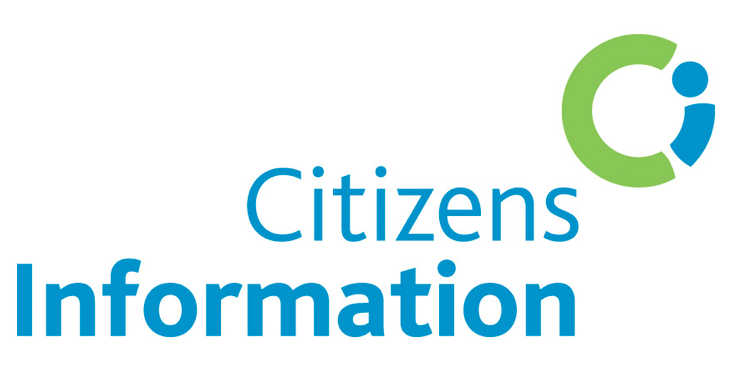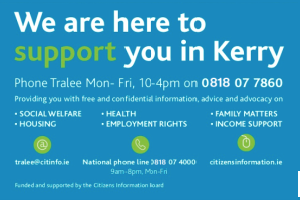 Know Your Rights has been compiled by Kerry Citizens Information Service which provides a free and confidential service to the public…
Know Your Rights has been compiled by Kerry Citizens Information Service which provides a free and confidential service to the public…
Who is entitled to Irish Citizenship?
You are entitled to claim Irish citizenship if any one of the following applies:
1. You were born in Ireland or Northern Ireland before 1 January 2005
2. You were born in Ireland or Northern Ireland after 31 December 2004 and one (or both) of your parents was an Irish or entitled to be an Irish citizen or a British citizen at the time of your birth Or one of the following scenarios apply to you
• One (or both) of your parents was an Irish or British citizen and died before you were born
• One (or both) of your parents was entitled to live in Ireland or Northern Ireland without any restriction on his or her period of residency
• One (or both) of your parents was legally resident on the island of Ireland for 3 out of the 4 years immediately before your birth (this does not include residence on a student visa, or residence while awaiting an international protection decision)
Continued below…

.
3. You were born abroad and one of the following scenarios apply to you:
• One (or both of your parents) was born in Ireland and was entitled to Irish citizenship
• Your grandparent was born in Ireland and you have entered your birth on the Foreign Births Register
• At the time of your birth, your parents had become an Irish citizen by registering with the Foreign Births Register or by naturalisation. You must register your birth with the Foreign Births Register before obtaining Irish citizenship.
4. You were born in Ireland and are not entitled to be a citizen of any other country.
Who is entitled to apply for Irish citizenship by naturalisation?
If you are not entitled to citizenship by birth or descent, you can apply to become an Irish citizen by naturalisation if one of the following situations apply to you:
• You have lived in Ireland legally for 5 out of the last 9 years ending on the day before your application and you have resided in Ireland legally for the 12 month period before your application & you are over 18
• You received a declaration as a refugee from the Minister for Justice & you have lived legally in Ireland for 3 years ending on the day of your application & you are aged over 18:
• You are currently married to or a civil partner of an Irish citizen & you have lived in Ireland legally for 3 out of the 5 years before the day of your application & you have resided in Ireland legally for the 12 month period before your application & you have been married and living together for 3 years
• You are a child born in Ireland who is not entitled to citizenship by birth & both you and one (or both) of your parents has lived in Ireland legally for 5 out of the 9 years ending on the day of your application & both you and one (or both) of your parents have resided in Ireland legally for the 12 month period before your application
How to apply for Citizenship through Naturalisation?
There are a number of steps to follow. First you need to check that you qualify and then you must complete an application form.
It is essential that you use the current version of the application from which you will get on the Immigration Service Delivery website.
You can get help with the form from your local Citizens Information Service. You will need to provide supporting documentation with your application and if your documents are in a language other than English, you must get them translated by a professional translating service.
All adult applicants must send a tax clearance certificate. This certifies that your tax affairs are in order.
When you have completed the application form and are ready to send the form and supporting documents, you will have to make a statutory declaration. A statutory declaration is a way of swearing that something is true.
It is a written statement and must be witnessed by someone who is authorised to witness your declaration.
Your completed form, with the relevant fee is then sent to the Immigration Service at the address on the form.
What rights does Citizenship give?
If you are an Irish citizen, you are entitled to
• Carry an Irish passport
• Live and work in Ireland without restriction
• Vote in a general election, constitutional referendum or presidential election
• Be elected to government in Ireland and in the European Union.
• Live, travel and work within the European Union
• Serve on a jury, unless you are disqualified or ineligible
• Receive diplomatic assistance abroad from an Irish or EU embassy
Can you hold Dual Citizenship?
Ireland allows dual citizenship, which means that you can become an Irish citizen and remain a citizen of another country.
Some countries do not allow dual citizenship and you should check the citizenship rules of your country of nationality if you are considering applying for Irish citizenship.
If you are a dual citizen, you can apply to have your non-Irish passport stamped with a Without Condition Endorsement (also called Stamp 6). This stamp says that you have a right to live in Ireland without any time conditions.
• For anyone needing information, advice or have an advocacy issue, you can call a member of the local Citizens Information team in Kerry on 0818 07 7860, they will be happy to assist and make an appointment if necessary.
The offices are staffed from Monday to Friday from 10am to 4pm. Alternatively you can email on tralee@citinfo.ie or log on to www.citizensinformation.ie for further information.












